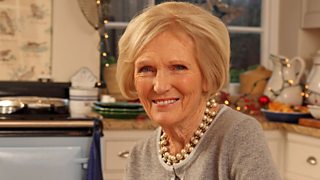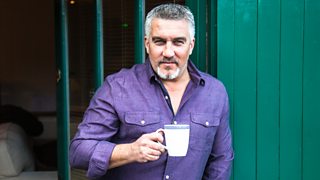11 things we learned from Delia Smith's Desert Island Discs
Delia Smith is arguably the most successful British food writer and broadcaster ever. She’s sold more than 21 million books in the UK and her TV career spans four decades.
She’s known for teaching cookery skills in a straight-forward, easy-to-follow style. Her widespread influence has led to the phrase ‘the Delia effect’, when large numbers of shoppers seek out her recommendations. She is also a long-time supporter of Norwich City FC, where she and her husband are majority shareholders.
Here’s what we learned from her Desert Island Discs...

1. Delia had a simple ambition with her first published recipes
“What I had in the back of my mind,” explains Delia, “was to take the fear away.”
Why should you be able to cook if no one's ever shown you how?
“I think people are afraid to cook... I found reading cookery books there was always something that they didn't say or I wasn't sure about. I just wanted to take the fear away, to make everything really explicit and infallible.”
“Why should you be able to cook if no one's ever shown you how? It's strange that people are expected to just leave school or go to university and then suddenly start cooking, it's ridiculous. You need to be taught. It's like giving people the keys to a car and saying ‘Off you go! Drive the car!’”
2. Post-war rationing shaped her early experiences of food
At the outbreak of World War Two, Britain was importing 55 million tonnes of food from all over the globe every year. The government feared that a German blockade would lead to food shortages, hoarding and rising prices, so food rationing was introduced the year before Delia was born.
“Everybody's sweet ration was two ounces a week,” remembers Delia. “Can you imagine the health of our nation now, if that was still going?”
“My mother was a great cook - both my grandmothers were. We couldn't afford to have holidays abroad or things like that, but we had wonderful food.”
Rationing of some items continued into the 1950s, and didn’t end completely until 1954, when Delia was 13 years old.
3. She credits her mum with her success
“She was very strict and she was my fiercest critic,” says Delia about her mother, Etty.
“I think I owe her a lot. In all the success I had, my feet were kept very firmly on the ground, and so I never had a chance to get big-headed.”

4. She can still remember the first time she heard her second track, from “the greatest album ever”
“I was cooking for somebody,” says Delia. “I was doing one of their dinner parties and I was in their kitchen up high and outside the kitchen there was another flat and I could hear this music and thinking, ‘What Is that?’ It's fantastic.” And that was the first time I heard [this track].”
First and foremost, it's a beautiful game. It's irritating. It's disappointing. You have pain, you have ecstasyDelia on her love of football
The song is the Beatles’ Within You Without You from 1967, Delia’s second choice of disc for her desert island.
“The thing I look back on and am so grateful for is that I was young at the time of the Beatles. I loved their music, but they had more than music to offer. A lot of their songs were poems, and they were about life and about wisdom.”
“The culmination of their whole contribution is the Sgt. Pepper album. It's just the greatest album ever.”
George Harrison’s deepening interest in Indian music and thinking is at the heart of Within You Without You:
"[It] was combining two continents together with different music so cleverly and the words... I think if you write the words out, which I've done, you don’t need any other lessons in life.”
Try to realise it's all within yourself,
No one else can make you change,
And to see you're really only very small,
And life flows on within you and without you.
5. Delia left school without any qualifications
“I can't really put my finger on why,” says Delia. “I just don't know. I did enjoy some school: I enjoyed music lessons and I enjoyed literature and English.”
“There were cookery lessons then,” she continues. “I think that was the only A I ever got!”
And Delia recalls that sometimes even the cookery classes didn’t end well: “We were supposed to make Yorkshire pudding and my Yorkshire pudding at the bottom was like a blancmange and I took it home and the dog wouldn't eat it!”
6. Washing dishes in a restaurant was the gateway to her career in food
Delia was a regular at a French restaurant in London and was always asking the chef questions about the food.
“The chef said, ‘We need a dishwasher on Saturday nights,’” recalls Delia.
“I did suddenly realise that I'd been brought up on really good English cooking, but being in a French restaurant and having these different things, I thought it was really glamorous, and I wanted to learn how to do it. So I went to be a washer-up and then I graduated to be a chopper-up.”
“The chef actually did teach me quite a lot and I did some waitressing too. And I think that's where my career came from - going out into the restaurant and serving people and understanding how little they knew.”
7. An unusual commission led to a cake that you can still see today
As well as the restaurant work, Delia started making dishes to be photographed for books and magazines. One memorable request was for “a gaudy cake” that had to look “really horrible.”
The cake, with plentiful piped cream and glacé cherries, was photographed for the cover of the album Let it Bleed by the Rolling Stones.
“It's like sometimes you feel like a spectator on your life,” says Delia - and fans still send her album covers to sign.
8. Delia and her husband came together over a shared love of food
Delia wrote her first cookery column in 1969 for the Daily Mirror magazine.
“I think it was kipper pâté, beef braised in beer and five-minute cheesecake,” remembers Delia.
“I used to deliver my handwritten copy and me and Michael [the deputy editor of the magazine] used to put it into English,” says Delia. “He liked food a lot and I liked food a lot, and that was something that drew us together.”
Delia and Michael married in 1971 and have been together ever since.
9. She loves football because it brings people together
Delia is a very dedicated fan of Norwich City FC: “First and foremost, it's a beautiful game. It's irritating. It's disappointing. You have pain, you have ecstasy. It's all those things. But I think one of the things that's so good about it now in this day and age is its community. It's one of the few places where community really does thrive.”
Delia’s total commitment to her club was never more evident than during a match against Manchester City in 2005.
Norwich were losing, and she thought the fans were failing to get behind their team. At half-time she headed onto the pitch with a microphone and told them what she wanted: “This is a message for possibly the best supporters in the world. We need a 12th man. Where are you? Where are you? Let's be having you! Come on!”
Delia says she forgot that the game was being televised, and a video clip of her half-time exhortation was widely shared. Many fans applauded Delia for the passion she showed for her club and even now, nearly 19 years on, she still hears it:
“I go to away matches and they all call out. ‘Let's be having you, Delia!’ It's lovely. I love it!”
10. When it comes to Christmas, Delia does it by the book
Although Delia has published two successful Christmas cookery books, she reveals that initially her publishers didn’t have much appetite for something so seasonal: “They didn't think it would sell. I think the publishers didn't want to publish a book that was only going to sell in December and I think the TV was the same.”
Now thousands of people turn to her books at this time of year – including Delia herself: “I can't remember anything and I must say it's very useful for Christmas Eve [being told], ‘Do this then and then do that.’”
11. She’s still a huge fan of Christmas and sees it as a special time
“I still think it's brilliant. I know there's lots of criticisms about the commercial thing, but it's a people thing. It's people coming together and people travelling across the country to see their friends and their relatives and I just think this whole idea of people having a celebration and eating too much and drinking too much - that's what life's about.”






